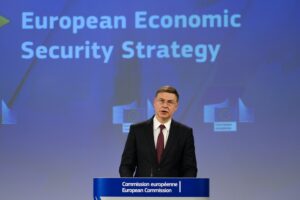On February 12-13, WITA will host its annual International Trade Conference. One of the authors of the following article, Marc Gilbert, will take part in the session titled “Geopolitical Impacts on Supply Chains.” Information can be found here and below. Following are excerpts from the article.
As the global economy adjusts to persistent economic and geopolitical pressures and disruptions, the familiar routes that defined the world trade map are being redrawn and trade blocs are playing a greater role. In addition, overall global trade is growing at a slower rate than the world economy, a fundamental shift away from the trend of trade-led globalism that has been prevalent since the end of the Cold War. World trade in goods is forecast to grow at 2.8% per year, on average, through 2032, compared with an estimated 3.1% growth rate for global GDP in the same period, according to a new BCG analysis…
AS COOPERATION COOLS, REGIONAL TRADE BLOCS RISE
A characteristic of the new world trade order will be the growing prominence of trade blocs—especially North America, the EU, ASEAN countries, and potentially the BRICs—as production moves closer to end markets. Blocs are attractive for countries seeking to limit geopolitical friction by trading with entities seen as “friendly” partners, especially where trade agreements exist, such as the EU, USMCA, Comprehensive and Progressive Agreement for Trans-Pacific Partnership, Regional Comprehensive Economic Partnership, and EU-Vietnam Free Trade Agreement.
Under the Biden administration, the US has adopted new industrial policies, with legislation that encourages direct investment in strategic industries such as semiconductors, domestic manufacturing, renewable energy production, and electric vehicle infrastructure and battery technology.
Combined with the USMCA, the net effect of these industrial policies is to pull investment back to the US—especially for industries deemed critical to national security, like computer chips. Trade between the US and Mexico stands to grow by an impressive $300 billion over the coming decade. The Inflation Reduction Act, for example, goes beyond familiar “Buy American” incentives to encompass a “Buy North American” approach, such as extending the $7,500 credit for electric vehicles with powertrains or battery technology made in the US, Canada, or Mexico.
|
01/08/2024 | Marc Gilbert, Nikolaus Lang, Georgia Mavropoulos, & Michael McAdoo | Boston Consulting Group
|
What Will 2024 Mean for the Future of Digital TradeThe 13th World Trade Organization Ministerial is quickly approaching, taking place February 26-29 in Abu Dhabi. The outcomes and issues discussed are likely to set the stage for the rest of the year. With respect to digital issues, announcements are expected on the Joint Statement Initiative on E-Commerce [JSI]. At the end of last year, co-conveners announced consensus text on the following areas: online consumer protection; electronic signatures and authentication; unsolicited commercial electronic messages (spam); open government data; electronic contracts; transparency; paperless trading; cybersecurity; open internet access; electronic transaction frameworks; electronic invoicing; and “single windows.” The intent is to conclude these negotiations by early 2024. With the U.S. withdrawal of support for key rules, however, the final framework will be significantly less impactful than hoped for. Absent any valid alternatives to text on data flows, localization, and source code protection, it is unclear whether parties to the exercise will succeed in delivery of a comprehensive and strong final agreement in the next year. To the extent that alternatives emerge that represent a significant weakening of proposed rules, the JSI could verge on being affirmatively unhelpful–legitimizing trade partners’ discretion to impose unjustified or discriminatory restrictions of digital service suppliers. Another key issue will be the renewal of the moratorium on imposing customs duties for electronic commerce, which has been renewed at every Ministerial since 2000. The prohibition on customs duties has been critical to the development of global digital trade, benefiting a wide range of MSMEs around the world. However, countries like India, South Africa, and Indonesia continued to oppose its renewal. Failure to renew this year will have significant implications for the millions of firms dependent on trading in software, games, video and other digitized products, while doing little to solve concerns on revenue. |
|
|
Responsible Consensus at the WTO Can Save the Global Trading System |
The international trading system is gearing up for another test of its resilience. In late February, trade ministers will meet in Abu Dhabi for the thirteenth ministerial conference (MC13) of the World Trade Organization (WTO) in hopes of concluding several ongoing trade negotiations and laying the groundwork for institutional reform. The list of agenda items is vast—WTO reform, a waiver for COVID-19 therapeutics and diagnostics, e-commerce, fisheries subsidies, agriculture, and investment for development—and consensus among WTO members remains far off.
That some WTO members have vehemently opposed the increasingly popular concept of plurilateralism is of particular concern. Plurilateral negotiations are open to all parties, but in practice are carried out by only those members who are particularly interested in the issue at hand. These negotiations have become the most pragmatic method of reaching agreement on new rules in an organization such as the WTO, which has grown far beyond its initial capacity.
But some countries, such as India, have strongly objected to any discussions that do not involve the entire 164-country WTO membership. Their objections are directly undermining efforts by the United States to make the WTO “more relevant to today’s challenges,” and potentially scuttling efforts to update international trade rules to address modern concerns. If the United States is as committed to the WTO as it claims to be, then it needs to convince those recalcitrant members to drop their obstructionist approach. India particularly is a heavyweight player in the WTO, and it should also, on its own, take the opportunity to chart a new course and productively engage in trade discussions where it has otherwise been absent.
The Plurilateral Drama And Investment Facilitation
Before the WTO went on holiday break in December 2023, India made a statement during a meeting of the General Council (which includes all members) to highlight what it thought were “sensitivities” surrounding new negotiations. In particular, India called out talks on investment facilitation for development (IFD), which substantially wrapped up last summer, saying that discussion of the topic “does not belong” at the WTO because there “has not been any Ministerial mandate for starting negotiations.” India’s objections stemmed not only from the fact that something related to investment was being discussed at the WTO, but also that a group of members decided to advance discussions on a shared issue of interest without agreement from all 164 member countries.
Over the last few years, India has been joined by South Africa and Namibia in arguing that plurilateral discussions are fundamentally at odds “with the multilateral underpinnings of the WTO.” Furthermore, India has even advanced the notion that plurilaterals undercut the WTO’s uniqueness in “[providing] rights to every individual member to have a say in deciding the negotiating agenda.”
What these countries seem to miss is that plurilateralism offers important benefits. First, the WTO has struggled to negotiate significant multilateral rules since its inception, and the growth in its membership has made such negotiations even more unwieldy. Plurilateral groupings bring together the countries most interested in a particular question, increasing the likelihood, as research has shown, of long-term compliance. An insistence on universal consensus, on the other hand, threatens to bring the WTO to a standstill.
|
|
|
Earlier this week, the U.S. Department of State announced that Chad P. Bown will be their new Chief Economist. Following are excerpts from his working paper titled “Trade policy, industrial policy, and the economic security of the European Union” published by the Peterson Institute for International Economics in January, 2024. Out of fear about its economic security, the European Union is transitioning to a new form of international economic and policy engagement. The Trump administration in the United States, Russia’s invasion of and war on Ukraine, and concerns over China’s increasingly aggressive foreign and economic policies have combined to put a new EU policy into motion. Without the assurance that other countries will continue to follow the rules of a multilateral trading system, the European Union is working through what comes next. It is taking steps to rebalance its position in the global economy. While seeking to preserve the benefits of interdependence with the rest of the world, the European Union is contemplating policies that would induce change. One change seeks to alter the footprint of global production for certain goods, affecting whom it sources imports from and whom it sells exports to. It wants to decrease certain trade dependencies (which could be weaponized) and increase others (to encourage diversification). A second change is the enactment of new contingent policy instruments intended to allow the European Union to respond more quickly when policymakers in other countries act badly (or to establish a credible threat sufficient to deter them from doing so in the first place)…. The European Union faces important choices and difficult tradeoffs. Its “open strategic autonomy” approach suggests a wish to remain internationally integrated with the outside world. Although interdependence failed to prevent Russia’s invasion of Ukraine, most of the evidence from the post–World War II process of European integration is that it can be an important force for policy moderation and peace. Although its perspective on China has become more jaded, Europe does not see eye to eye with Washington. The differing views partly reflect the fact that, unlike the United States, Europe is not bound by treaty to uphold the military security of countries in Asia and the Pacific. But European positioning toward China also represents a hedge, as the bloc’s own future relationship with the United States remains uncertain over fear of the reelection of Trump, who has already proposed imposing a 10 percent tariff on all imports, including imports from Europe. At the same time, the European Union is facing increasing threats to its economic security from China. This section illustrates them by examining ongoing EU–China disputes over EVs, critical minerals, and materials needed to manufacture batteries. It then explores the data, which, paradoxically, suggest that not only is this case study not unique but that some of Europe’s trade may be becoming more rather than less dependent on China, for reasons outside of the control of European policymakers. |
|
|





